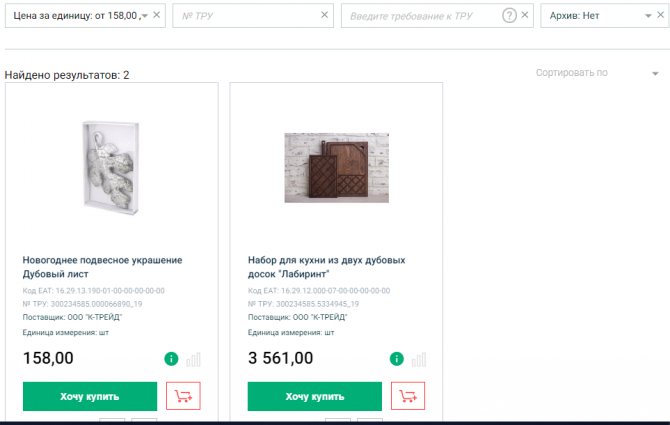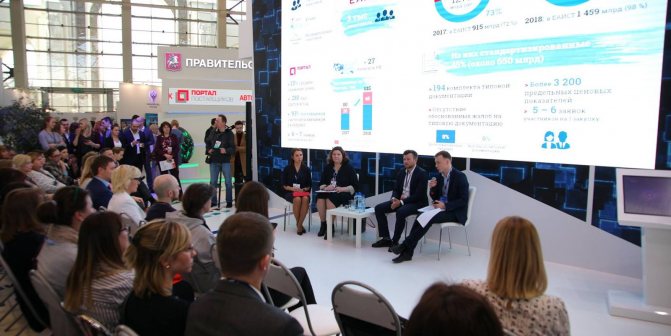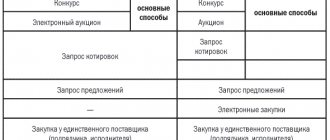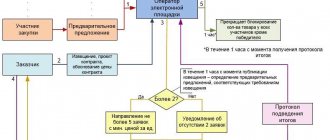Difference from 44-FZ
The strict law 44-FZ, according to which state and municipal customers are required to conduct procurement, creates much less choice. In contrast, work under 223-FZ assumes:
- that customers independently develop rules for conducting procurement procedures, which are prescribed in the Procurement Regulations ;
- that the person entrusted with procurement can be any specialist from the organization (no specialized education is required);
- that trading can be organized on any electronic trading platforms (there are more than 150 of them).
What is the difference between direct contracts under foreign economic activity and 44-FZ
Enterprises can operate not only within Russia, but also have foreign partners, purchases from whom are also carried out on a competitive basis or under direct contracts. In this case, the counterparties enter into a foreign economic activity (foreign economic activity) contract. A Russian importing company purchases goods from a foreign manufacturer, therefore, this transaction falls under the rules of customs legislation, and not contract law.
Article 93 44-FZ establishes the following conditions for direct purchases from a single supplier:
- up to 300,000 rubles (according to clause 4, part 1, article 93 44-FZ);
- up to 600,000 rubles (according to clause 5, part 1, article 93 44-FZ).
These restrictions on the limit of direct contracts under 44-FZ have been introduced since the summer of 2021. For the first point, until July 1, 2019, there was 100,000 rubles, and for the second, until July 31, 2019, it was 400,000 rubles.
If a direct contract is concluded with a single supplier, then the customer does not need to justify the feasibility of choosing a contractor, price and other significant provisions of the contract. There is also no need to place information about direct purchases in the UIS. It is only necessary to draw up a plan and schedule, which includes information on the total volume of purchases, differentiated by the essential terms of the contract, including direct deliveries. To make it more convenient to prepare financial reports, it is advisable to maintain a separate register of direct contracts.
Who does Law 223-FZ apply to?
If we simplify the provisions of paragraph 2 of Article 1 of Law 223-FZ and present them in accessible language, then all customers can be divided into three groups:
Registration in the ERUZ UIS
From January 1 2020 , in order to participate in bidding under 44-FZ, 223-FZ and 615-PP, registration in the ERUZ register (Unified Register of Procurement Participants) on the EIS (Unified Information System) portal in the field of procurement zakupki.gov is .ru.We provide a service for registration in the ERUZ in the EIS:
Order registration in the EIS
- State companies and corporations, subjects of natural monopolies. The share of state participation in such organizations is more than 50% .
- Subsidiaries of the organizations specified in paragraph 1, in which the share of the state parent is more than 50% . And also the daughters of the subsidiaries themselves on the same conditions.
- State and municipal unitary enterprises and budgetary institutions - in terms of procurement with their own income or received grants, as well as in cases where they themselves are executors of contracts and attract third parties under the contract.
Concept
Potential participants in public procurement may encounter the concept of “direct contract”. But here it is worth noting that this form of concluding a transaction is used not only in the contract system, but also within the framework of foreign economic activity.
- Direct purchase in foreign economic activity is an agreement concluded between the Russian importer and the direct manufacturer of the goods, which is regulated by customs legislation.
- A direct contract under 44-FZ is a form of contracting in which the customer signs an agreement with a single supplier without holding competitive auctions. It is applicable for small volume purchases.
The main aspects of such relationships are regulated by Art. 93 Federal Law No. 44.
On July 1, 2021, changes were made to the article that affected the amounts of the direct contract.
Today, at the legislative level, there are two types of agreements with limits:
- up to 300 thousand rubles;
- up to 600 thousand rubles.
Direct procurement also includes urgent procurement, when it must be carried out as quickly as possible, since the maximum period for purchasing from a single supplier is no more than three days.
Preparation for procurement activities
Before making purchases, the customer can go through the preparatory stage . It consists of several steps:
- Obtaining an electronic digital signature. To do this, you need to contact any certification center that issues a cap for trading.
- Registration on the government procurement website zakupki.gov.ru.
- Development and approval of the Procurement Regulations.
- Drawing up a procurement plan and publishing it in the Unified Information System (on the government procurement website).
- Getting to know your EIS personal account and setting it up.
As for the Procurement Regulations under 223-FZ , it must provide for the following:
- Methods used by the customer to determine the supplier.
- The order of procedures.
- Everything about timing.
- Supplier evaluation criteria.
- The procedure for concluding, amending and terminating a contract.
- Payment order.
- Responsibility of the parties and the procedure for resolving disputes.
Example
For example, if we purchase oak boards under a direct contract, we can do this on the Unified Trade Aggregator.

If you find this product cheaper than on EAT, then enter into a direct government contract in the usual manner. You draw up an agreement in which you define the object of the order, price, and conditions. You will find a sample of such an agreement in the article “How contracts are drawn up under 44-FZ”. Then you agree and sign. After you conclude, do not forget to enter information about the direct contract in the register on EAT.
The most important thing for the customer
The main thing to remember is the need to place the Procurement Regulations in the Unified Information System . If this is not done, the customer will lose the right to purchase under 223-FZ. In this case, its procurement activities will be regulated by law 44-FZ.
Another important point is to comply with all deadlines . They are:
- The procurement regulation, as well as its changes, must be posted in the Unified Information System within 15 days from the date of approval;
- 20 days are given for posting a procurement notice before the closing date for applications;
- 3 days for posting changes to the notice ;
- placement of procurement documentation is carried out together with the publication of the notice;
- clarifications that the customer gives in response to requests from participants are published no later than 3 days from the date of receipt of the request;
- protocols that are drawn up during the procurement must be posted within 3 days ;
- 3 days are given for publication of the signed agreement ;
- changes made to the contract are posted no later than 10 days ;
- monthly procurement report under 223-FZ - no later than the 10th (for the past month);
- once a year - before February 1 of the year following the reporting year - the customer posts a procurement report from SMEs.
Minimum deadlines have also been established for accepting applications from participants. They vary depending on the type of procedure and whether the supplier is an SME. We have presented these deadlines in the following table.
Procurement School: What is a direct contract with a single supplier
That is, a purchase that the customer makes from a single contractor, in cases permitted by law (clause 4, part 1, article 93 of Law No. 44-FZ).
In what cases is it permissible to conclude a direct contract and which customers can enter into a contract for 400 thousand rubles, we will tell you in the article.
What is considered to be a direct contract with a single supplier. We can say that the customer has entered into a direct contract with a single supplier (or has made a small-volume purchase) if we are talking about the purchase of goods worth up to 100 thousand rubles from a single contractor on the basis of clause 4, part 1, article 93 of Law No. 44-FZ. Or, in some cases, up to 400 thousand (more on this later).
Direct contracts with a single supplier are , on the one hand, the simplest type of procurement procedures. After all, the customer does not need to waste time and effort on conducting competitive procedures, preparing volumes of documentation, monitoring every detail in a cumbersome process, so as not to incur the wrath of the FAS. On the other hand, direct contracts for exactly the same reason are a potential “gold mine” for corrupt officials and unscrupulous customers. Therefore, the law on the contract system quite strictly regulates cases when and how direct contracts can be concluded.
Volume of purchases from a single supplier. The Contract System Act allows customers to enter into direct contracts with a single supplier, while limiting the overall permissible scope of such procedures. Thus, the volume of purchases from a single supplier on this basis per year should not be more than the limit of 2 million rubles or 5% of the total financial volume of purchases made in general.
And also it should not be more than 50 million rubles. Many customers have a question about how this limit can be calculated in practice, and how to link general volume restrictions with the limit on the amount of the purchase itself of 100 (or 400) thousand rubles.
It makes sense to make percentage calculations for organizations with a substantial budget, that is, if the organization’s annual procurement budget is 200 million rubles, then the limit on 100,000-dollar contracts will in this case be 5% or 10 million rubles. Or, respectively, 100 small-volume contracts of 100 thousand each, which the customer can conclude per year.
Some people sign direct contracts for 100 thousand, and some for 400 thousand. The alternative purchasing limit for direct contracts with a single supplier is 400 thousand rubles instead of 100 for a certain category of customers, including cultural institutions, zoos, libraries, and other institutions, the list of which is given in Art. 93 of Law No. 44-FZ.
Restrictions for customers of this type, according to the law on the contract system, are 50% of the annual volume of all purchases or 20 million rubles. For violation of the annual direct purchase limit within the above framework, regardless of which category the customer belongs to, he risks falling under administrative liability in the form of a fine.
The general rules for concluding a direct contract are as follows: the customer first plans the purchase, determines its cost and terms of the contract, and then directly transfers this information to the contractor he has chosen for review. If the supplier is satisfied with everything after review, then the customer and supplier enter into a contract on the basis of clause 4, part 1, article 93 of Law No. 44-FZ.
Direct contract and subcontracting . It should be noted that in the field of procurement, the phrase “direct contract” or “direct transaction” is also used in a different meaning. This definition is not found in procurement legislation, but in practice it is often used.
A direct contract in this meaning of the term means an option when the customer enters into a deal with the direct contractor, that is, without further involvement by the contractor of a subcontract or co-contractors. The law also allows the customer the opportunity to establish a ban on an indirect contract, that is, for the contractor to involve subcontractors to directly perform the work.
Head of the Municipal Procurement Sector of the District Administration I.V. Pavlenko
Purchases up to 500 thousand rubles will be carried out on the supplier portal
Entities whose activities are regulated by Federal Law No. 223-FZ of July 18, 2011 can now use the automated information system “Supplier Portal” . This was announced by Vladimir Efimov, Deputy Mayor in the Moscow Government for economic policy and property and land relations, at the All-Russian forum and exhibition “Government Order”.
“Starting March 1, 2021, customers purchasing under Law No. 223-FZ have the opportunity to use the supplier portal to make small-volume purchases electronically up to 500 thousand rubles. This was facilitated by the introduction of new technological solutions into a unified digital procurement management platform,” he said.
The possibility of using the system by these customers is approved in the regulations on the procurement of goods, works and services by certain types of legal entities. According to Vladimir Efimov, now more than 500 organizations operating under Federal Law No. 223-FZ are registered on the portal.
Moscow presented a unified digital procurement management platform at the State Order forum. How a supplier portal helps increase the volume of government procurement from small businesses
About three thousand city customers use the resource, added Gennady Degtev, head of the Moscow City Department for Competition Policy. In his opinion, the supplier portal is proving its effectiveness and should be available to more customers.

“Carrying out small purchases on a resource creates an open, transparent competitive environment. More than 140 thousand companies offer a wide range of goods, works and services. Customers - replace have the opportunity to choose a specific item in the new catalog - replace standard product units at the optimal price for themselves. The possibility of holding quotation sessions is provided. When using this procedure, the average reduction in the starting purchase price is 13 percent, and it is possible to conclude a contract based on the results of the session within 24 hours,” noted Gennady Degtev.
in your personal account on the supplier portal , reminded Eduard Lysenko, head of the capital’s Department of Information Technologies.
“Given that in the area regulated by Law No. 223-FZ, a significant part of the entities do not have their own automated procurement system, the portal provides the opportunity to work in a personal account. For those who use their own information systems, various integration formats are provided for purchasing from entrepreneurs registered on the supplier portal. Thus, technologically and functionally, the resource now ensures that subjects can work under both Law No. 44-FZ and Law 223-FZ,” he explained.
The All-Russian forum-exhibition “Government Order” is taking place in the capital from April 3 to 5 . It was organized with the support of the All-Russian Popular Front, the Government of Russia, the State Duma, the Ministry of Economic Development of Russia, the Federal Antimonopoly Service of Russia, the Accounts Chamber of the Russian Federation and the Chamber of Commerce and Industry of the Russian Federation.
Explanations on the topic
| Main points | Document details | Download |
| In purchases from a single supplier under clause 4, part 1, art. 93 of the law on the contract system up to 100,000 rubles, the customer does not need to draw up documents to verify the participant’s compliance with the requirements established in Part 1 of Art. 31 laws on the contract system | Letter of the Ministry of Economic Development No. D28i-3139 dated 10/19/2015 | |
| When concluding a contract, the customer is obliged under clause 4, part 1, art. 93 44-FZ indicate that the price of a government contract is fixed and is determined for the entire period of execution | Letter of the Ministry of Economic Development No. OG-D28-7129 dated 06/08/2016 |










